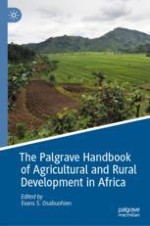2020 | OriginalPaper | Chapter
Fostering Rural Development and Social Inclusion in East Africa: Interrogating the Role of Cooperatives
Author : Mangasini Katundu
Published in: The Palgrave Handbook of Agricultural and Rural Development in Africa
Publisher: Springer International Publishing
Activate our intelligent search to find suitable subject content or patents.
Select sections of text to find matching patents with Artificial Intelligence. powered by
Select sections of text to find additional relevant content using AI-assisted search. powered by
